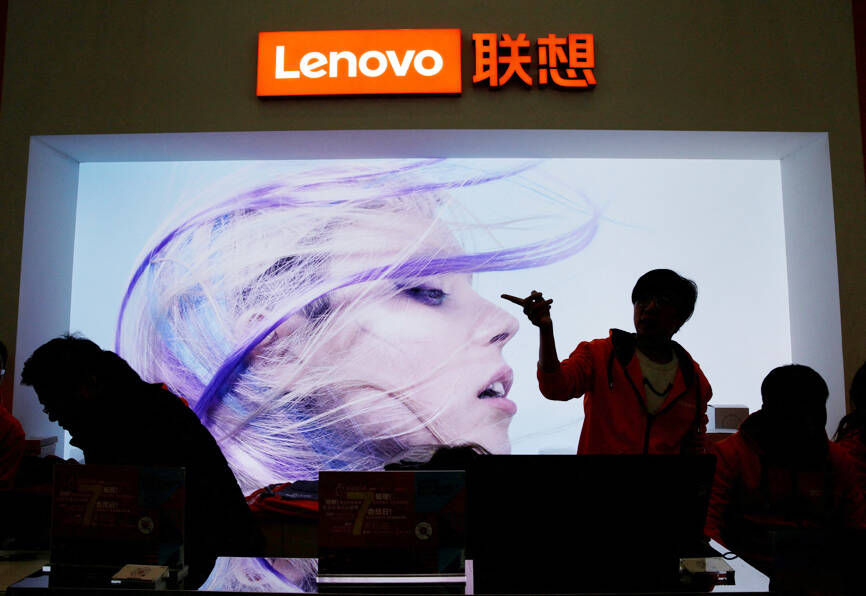Lenovo Group Ltd (聯想) started building artificial intelligence (AI) servers in India’s south, the latest boon for the rapidly growing country’s push to become a high-tech powerhouse.
The company yesterday said it has started making the large, powerful computers in Pondicherry, southeastern India, moving beyond products such as laptops and smartphones.
The Chinese company would also build out its facilities in the Bangalore region, including a research lab with a focus on AI.

Photo: Reuters
Lenovo’s plans mark another win for Indian Prime Minister Narendra Modi, who tries to attract more technology investment into the country. While India’s tense relationship with China has suffered setbacks in the past few years, global tech companies see it as an attractive option to build out operations as Beijing and Washington are mired in a trade war.
The servers perform the computations needed to run services including generative AI, made famous by apps such as ChatGPT. The addition of AI servers means Lenovo would make its entire stack of hardware in India for the domestic as well as export markets, underscoring the country’s importance for the company.
While India’s tech manufacturing sector is still small compared with China, it has been catching up and now makes increasingly sophisticated products such as iPhones. AI servers represent another milestone, showing that India can offer an alternative to regions with more established high-end manufacturing industries.
Taiwan currently produces the bulk of the world’s AI servers, which are used by technology giants such as Amazon.com Inc, Microsoft Corp and Nvidia Corp.
However, with geopolitical tensions on the rise between China and the West, companies are under pressure to shift manufacturing outside Taiwan.
Demand for generative AI tools and applications has sent the need for related hardware soaring, with electronics manufacturer Foxconn Technology Group (富士康科技集團) last year predicting that annual sales of AI servers could reach US$150 billion by 2027.

TAKING STOCK: A Taiwanese cookware firm in Vietnam urged customers to assess inventory or place orders early so shipments can reach the US while tariffs are paused Taiwanese businesses in Vietnam are exploring alternatives after the White House imposed a 46 percent import duty on Vietnamese goods, following US President Donald Trump’s announcement of “reciprocal” tariffs on the US’ trading partners. Lo Shih-liang (羅世良), chairman of Brico Industry Co (裕茂工業), a Taiwanese company that manufactures cast iron cookware and stove components in Vietnam, said that more than 40 percent of his business was tied to the US market, describing the constant US policy shifts as an emotional roller coaster. “I work during the day and stay up all night watching the news. I’ve been following US news until 3am

UNCERTAINTY: Innolux activated a stringent supply chain management mechanism, as it did during the COVID-19 pandemic, to ensure optimal inventory levels for customers Flat-panel display makers AUO Corp (友達) and Innolux Corp (群創) yesterday said that about 12 to 20 percent of their display business is at risk of potential US tariffs and that they would relocate production or shipment destinations to mitigate the levies’ effects. US tariffs would have a direct impact of US$200 million on AUO’s revenue, company chairman Paul Peng (彭雙浪) told reporters on the sidelines of the Touch Taiwan trade show in Taipei yesterday. That would make up about 12 percent of the company’s overall revenue. To cope with the tariff uncertainty, AUO plans to allocate its production to manufacturing facilities in

Six years ago, LVMH’s billionaire CEO Bernard Arnault and US President Donald Trump cut the blue ribbon on a factory in rural Texas that would make designer handbags for Louis Vuitton, one of the world’s best-known luxury brands. However, since the high-profile opening, the factory has faced a host of problems limiting production, 11 former Louis Vuitton employees said. The site has consistently ranked among the worst-performing for Louis Vuitton globally, “significantly” underperforming other facilities, said three former Louis Vuitton workers and a senior industry source, who cited internal rankings shared with staff. The plant’s problems — which have not

COLLABORATION: Given Taiwan’s key position in global supply chains, the US firm is discussing strategies with local partners and clients to deal with global uncertainties Advanced Micro Devices Inc (AMD) yesterday said it is meeting with local ecosystem partners, including Taiwan Semiconductor Manufacturing Co (TSMC, 台積電), to discuss strategies, including long-term manufacturing, to navigate uncertainties such as US tariffs, as Taiwan occupies an important position in global supply chains. AMD chief executive officer Lisa Su (蘇姿丰) told reporters that Taiwan is an important part of the chip designer’s ecosystem and she is discussing with partners and customers in Taiwan to forge strong collaborations on different areas during this critical period. AMD has just become the first artificial-intelligence (AI) server chip customer of TSMC to utilize its advanced